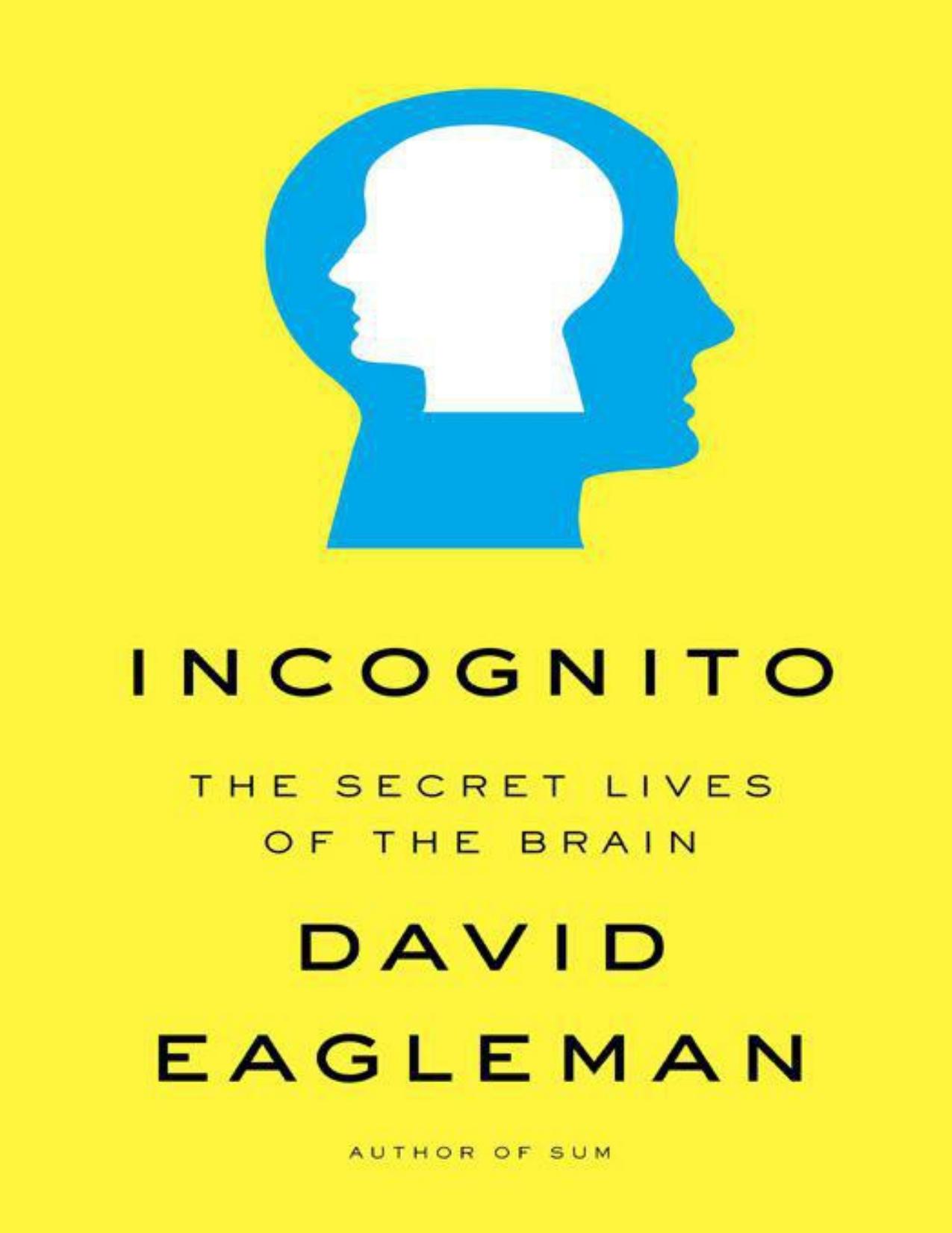Incognito: The Secret Lives of the Brain by David Eagleman

Author:David Eagleman
Language: eng
Format: mobi, epub, azw3, pdf
Tags: Non-fiction
ISBN: 9780307377333
Publisher: PANTHEON
Published: 2011-05-01T10:00:00+00:00
THE MULTITUDES
Let’s circle back to how this allows us to think about our brains in a new way—that is, how the team-of-rivals framework allows us to address mysteries that would be inexplicable if we took the point of view of traditional computer programs or artificial intelligence.
Consider the concept of a secret. The main thing known about secrets is that keeping them is unhealthy for the brain.46 Psychologist James Pennebaker and his colleagues studied what happened when rape and incest victims, acting out of shame or guilt, chose to hold secrets inside. After years of study, Pennebaker concluded that “the act of not discussing or confiding the event with another may be more damaging than having experienced the event per se.”47 He and his team discovered that when subjects confessed or wrote about their deeply held secrets, their health improved, their number of doctor visits went down, and there were measurable decreases in their stress hormone levels.48
The results are clear enough, but some years ago I began to ask myself how to understand these findings from the point of view of brain science. And that led to a question that I realized was unaddressed in the scientific literature: what is a secret, neurobiologically? Imagine constructing an artificial neural network of millions of interconnected neurons—what would a secret look like here? Could a toaster, with its interconnected parts, harbor a secret? We have useful scientific frameworks for understanding Parkinson’s disease, color perception, and temperature sensation—but none for understanding what it means for the brain to have and to hold a secret.
Within the team-of-rivals framework, a secret is easily understood: it is the result of struggle between competing parties in the brain. One part of the brain wants to reveal something, and another part does not want to. When there are competing votes in the brain—one for telling, and one for withholding—that defines a secret. If no party cares to tell, that’s merely a boring fact; if both parties want to tell, that’s just a good story. Without the framework of rivalry, we would have no way to understand a secret.*** The reason a secret is experienced consciously is because it results from a rivalry. It is not business as usual, and therefore the CEO is called upon to deal with it.
The main reason not to reveal a secret is aversion to the long-term consequences. A friend might think ill of you, or a lover might be hurt, or a community might ostracize you. This concern about the outcome is evidenced by the fact that people are more likely to tell their secrets to total strangers; with someone you don’t know, the neural conflict can be dissipated with none of the costs. This is why strangers can be so forthcoming on airplanes, telling all the details of their marital troubles, and why confessional booths have remained a staple in one of the world’s largest religions. It may similarly explain the appeal of prayer, especially in those religions that have very personal gods, deities who lend their ears with undivided attention and infinite love.
Download
Incognito: The Secret Lives of the Brain by David Eagleman.epub
Incognito: The Secret Lives of the Brain by David Eagleman.azw3
Incognito: The Secret Lives of the Brain by David Eagleman.pdf
This site does not store any files on its server. We only index and link to content provided by other sites. Please contact the content providers to delete copyright contents if any and email us, we'll remove relevant links or contents immediately.
The Art of Thinking Clearly by Rolf Dobelli(10455)
The 5 Love Languages: The Secret to Love That Lasts by Gary Chapman(9790)
Mindhunter: Inside the FBI's Elite Serial Crime Unit by John E. Douglas & Mark Olshaker(9324)
Becoming Supernatural by Dr. Joe Dispenza(8204)
Nudge - Improving Decisions about Health, Wealth, and Happiness by Thaler Sunstein(7693)
The Road Less Traveled by M. Scott Peck(7594)
Mastermind: How to Think Like Sherlock Holmes by Maria Konnikova(7323)
Enlightenment Now: The Case for Reason, Science, Humanism, and Progress by Steven Pinker(7306)
Win Bigly by Scott Adams(7184)
The Way of Zen by Alan W. Watts(6601)
Factfulness: Ten Reasons We're Wrong About the World – and Why Things Are Better Than You Think by Hans Rosling(4734)
The State of Affairs by Esther Perel(4712)
Gerald's Game by Stephen King(4642)
Man's Search for Meaning by Viktor Frankl(4585)
The Confidence Code by Katty Kay(4251)
Thinking in Bets by Annie Duke(4218)
The Healing Self by Deepak Chopra(3568)
Hidden Persuasion: 33 psychological influence techniques in advertising by Marc Andrews & Matthijs van Leeuwen & Rick van Baaren(3552)
The Worm at the Core by Sheldon Solomon(3486)
